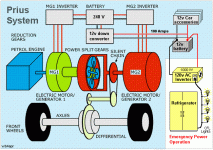I thought I had been instructed that a Watt was a unit of power. Just like a gallon is a unit of volume.
And regardless how you slice it, be it a quart a minute for four minutes, or a gallon all at once, the same amount of whatever was being transferred.
So if you have a 1000 milliwatts of energy available, you can take the entire amount in a moment (like discharging a capacitor across low resistance), OR dribble it out at 100mW/hr over 10 hours. It's the same total amount of energy.
So saying you have 1000 mW available describes capacity perfectly, just like a gallon.
Your description is close. 100mW delivered for 10 hours is exactly the same as 1000mW storage available.
I've got a 125 mW memory saving Li-ion battery down on the bench merrily lighting a green LED that draws about 15mW at 3 Volts
The set up is good for a few days, then the battery is drained and needs charging. The numbers work out so long as I apply a fudge factor for the age and condition of the battery. ;-)
Watts are Watts! ;-)
Now energy generation capacity needs to be stated as continuous or peak output, but that's

